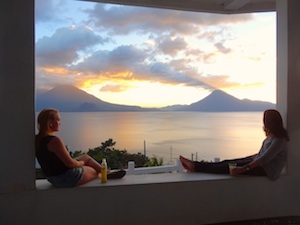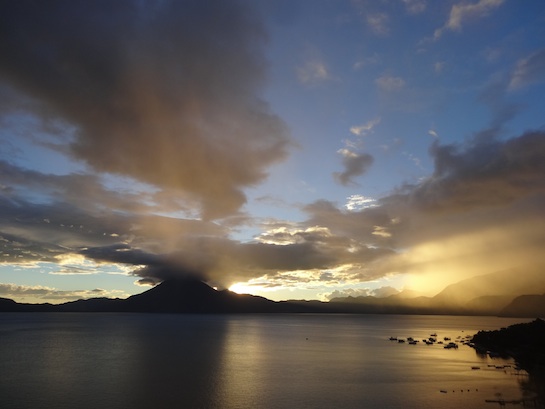 The sun was on the verge of vanishing. It was moving faster and faster towards it’s home under the horizon when it simply stopped.
The sun was on the verge of vanishing. It was moving faster and faster towards it’s home under the horizon when it simply stopped.
Now it’s just sitting there, perched on its’ volcanic mountain ridge.
I remove my sunglasses and stare directly into the fire. The sun is motionless. I concentrate, making every effort to remain still. But there’s no change. My eyes begin to water and I’m forced to look away.
Suddenly I can see with a clarity reminiscent of my childhood; a time when the world appeared always pure and constantly full of mystery.
I immediately notice that the water line of the lake has dropped by more than 15 feet. There are fish dancing amidst sunlit ripples. And the stench of burning garbage has been replaced by the most wonderful smell of pines, palms, green grass and flowers. The natural world is so pristine, it’s beauty is overwhelming.
My eyes still sore from staring into the sun, I decide to replace my sunglasses. And in that instant, the world returns to as it was. The fumes from burning plastic sting my nostrils and the lake is lifeless once again.
“What the hell just happened?” I whisper to the wind.
The sun descends beneath the horizon. It’s light shines upwards coating wispy clouds in warm oranges. The three volcanoes, their outlines illuminated by a pink hue, stand regally over the lake. But the water looks ominous now, a colorless canvas, an infinite and eternal abyss.
This world, the ephemeral beauty of this sunset, and it’s reflection on this crater carved lake is more mysterious than I will ever know.
Lake Atitlan is located in the highlands of Guatemala. For centuries this isolation has served to protect the local Mayan culture as well as the lake’s unique biosphere.
Unfortunately, Lake Atitlan is under threat from the forces of climate change, poor agricultural practices and an ever-expanding tourism industry.
Over the past 10 years, bigger and stronger hurricanes and increased rainfall has caused a water level rise of around 15 feet, inundating homes. While some claim a cyclical phenomenon, most scientists attribute this increase to climate change.
Changing water temperatures and the increase of phosphate based fertilizes running off into the lake have also led to the growth of oxygen depleting Cyanobacteria. This bacterium doesn’t just make swimming dangerous but it also kills aquatic life and subsequently the livelihoods of over 400 fishermen.
After over 10 years of backpacking I’ve never felt more connected to the natural world than I have while witnessing the sunset over Lake Atitlan. Through it’s fleeting beauty, the transience of life becomes all too clear. It reminds us to focus on the present. It compels us to take action now or risk losing our natural treasures forever. Finally, it provokes gratitude for the fortunate lives we live and this amazing Earth we inhabit.
